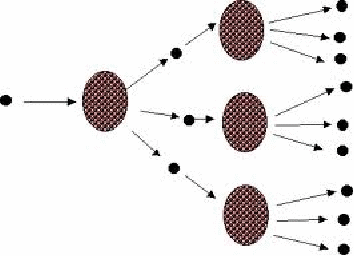Nuclear fission is the name given to the process whereby large nuclei break up into smaller ones. In the process energy is released. Fission is the process used in nuclear power stations and many atom bombs. A typical reaction involves bombarding a![]() nucleus with neutrons, which may cause the nucleus to fragment. A possible reaction is shown below.
nucleus with neutrons, which may cause the nucleus to fragment. A possible reaction is shown below.
![]()
Three more neutrons are produced in this reaction, each of which can cause another fission reaction. A chain reaction is possible, resulting in the production of massive amounts of energy very quickly.

This is what happens in an atom bomb. Only![]() of the Uranium isotopes reacts in this way. In nature, only about 0.7% of Uranium is of this isotope, so Uranium is enriched to increase the proportion of
of the Uranium isotopes reacts in this way. In nature, only about 0.7% of Uranium is of this isotope, so Uranium is enriched to increase the proportion of![]() The bomb, essentially several uranium fragments, is ignited by bringing these fragments together. This increases the probability of a neutron causing a further decay, so causing a chain reaction.
The bomb, essentially several uranium fragments, is ignited by bringing these fragments together. This increases the probability of a neutron causing a further decay, so causing a chain reaction.
A similar chain reaction in a nuclear power station is possible but prevented by controlling the rate at which free neutrons can cause further fission reactions with 'control' rods. These absorb stray neutrons.
